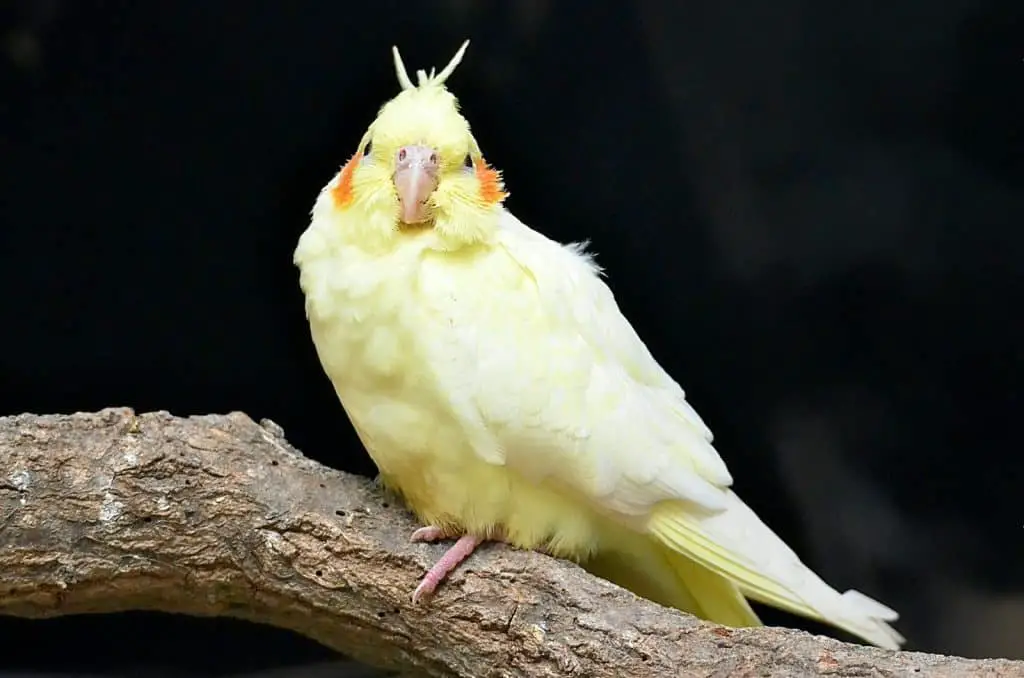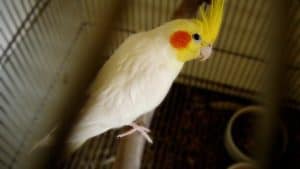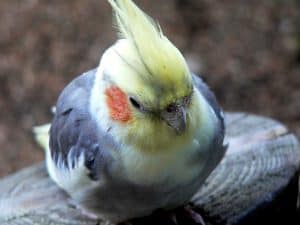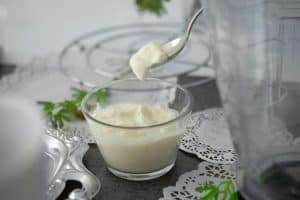Birds in the wild don’t show when they’re sick because predators might take advantage of them. However, pet birds are often too shy to vocalize their illness, which can make it difficult for owners to know when something is wrong. Pay attention to any changes in your cockatiels illnesses, behavior, character, activity level or physical health so you can ensure they stay happy and healthy. Take your sick birds to avian veterinarian right away if needed.
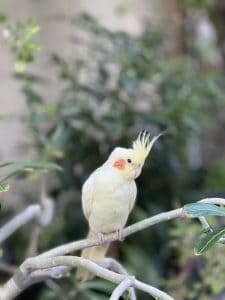
Cockatiels Illnesses
Cockatiels, like other birds, are skilled concealers when it comes to illnesses. This is a self-preservation mechanism since the unhealthy and weak are the ones that predators will seek out. When your cockatiel appears unwell, you may assume that your pet is seriously ill and will soon deteriorate without prompt therapy.
It is essential to observe your cockatiel carefully every day so you can be familiar with its typical behavior. This way, you will notice any changes that might suggest it is ill and needs to see a vet. Here are some signs of illness to look for:
Cockatiels Illnesses: Signs of illness to watch out for:
Could be serious – consult with vet:
- diminished appetite
- unkempt appearance
- Excess amounts of white or yellowish mucus may indicate a urinary tract infection, which is considered an abnormally large amount.
- compulsive feather picking or plucking
- Sleep position is abnormal (continuous, both feet on the perch when normally one foot is tucked up, head tucked under the wing, head turned towards the wing with eyes only partly closed)
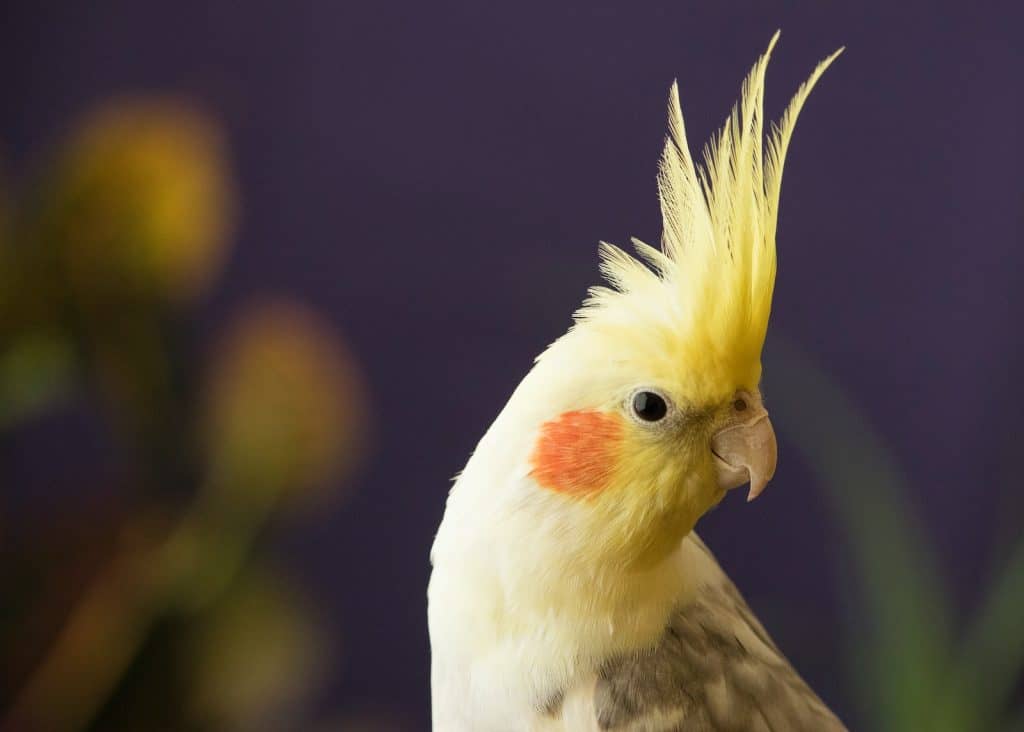
Cockatiels Illnesses: Critical / Serious – bird needs to be taken to vet:
- The tail was wagging rapidly.
- mucus or pus drainage from the beak, eyes, or nostrils
- A build-up of mucus and semi-digested seed on the face and head feathers, as well as abnormal droppings.
- Affected birds have abnormally developed feathers, feather growth, bleeding feathers, or an abnormal molt.
- dull or swollen eyes
- falling off the perch
- hunched over posture
- lumps or swellings on the body
- sitting on the bottom of the cage
- vomiting
Lutino cockatiel syndrome:
- crown baldness
- uncontrolled bleeding caused by a lack of clotting factor in the blood
- Children who are more vulnerable to illness seem mentally handicapped or undeveloped.
- Unbalanced, seems intoxicated
- At night, the cockatoo’s perch loosens and it falls off.
- bruising and bleeding on wing tips and abdomen, pectoral muscle prone to trauma, falls easily, many genetic problems.
- Parrot Essential Toy: The bird parrot toy provides essential physical activity to keep your feather friends stable and happy, and improve your health. There are several multi-colored blocks in this single toy to entice your bird. These blocks are arranged in multiple layers to climb and explore.Birds also love to untie cotton rope knots, which satiates their natural urge to chew.
- Safe To Chew: Our wood parrot toys are made of pure natual wood & cotton rope, all of them are dyed by edible pigments, and completed with pure handmade which are more bite resistand and durable.
- Perfect Size: The size is 13.78" X 5.12". perfect size for small and medium birds. It is suggested for african greys, budgies, parakeets, cockatiels, conures, lovebirds and other similar sized birds. Provide your bird an ideal elevated place to chew and climb.
- Beak Trimmed: Parrot's beak keeps growing to keep sharp. if her beak is long can affect the ability of the parrot to eat and damage her health. Our parrot chew toys contain colored wooden blocks and other accessories in various shapes to attract your parrot to chew, help your feather friends to preen and condition their beak.
- Best Gifts For Your Parrot: It is designed in bright color, which can easily attract parrots attention in short time and they will play with these toys for long time daily, keep your parrots busy, less destructive and have more fun hours.
Cockatiels Illnesses / Health Problems Cockatiels Commonly Come Down With:
- Malnutrition
- The most prevalent deficiencies in seed junkies are vitamin A and calcium. Because seeds are higher in fat than other foods, many seed eaters are also overweight.
- A lack of vitamin A can result in a decrease in appetite and digestion, as well as an increase in vulnerability to infection and parasites.
- Overweight birds are more likely to get arthritis and fatty liver disease.
What you can do to help your pet bird with cockatiels illnesses:
- A great way to safely provide this nutrient is by introducing healthy foods such as green leafy vegetables, red or orange fruits and veggies (which contain beta-carotene), and calcium blocks.
- Offer sprouted seeds rather than fresh fruits and vegetables for seed-addicted birds. Fresh or germinated seeds are often more readily accepted by “seed addicts” than fresh fruits and vegetables.
- The nutritional quality and value of seeds and grains improves when they germinate, as this lowers the amount of fat stored in them.
- Sprouted seeds will give your bird a healthy addition to his or her diet by providing a high-protein, vitamin, mineral, enzyme, and chlorophyll-rich supply.
- Oil seeds that have been soaked and germinated, like niger and rape seeds, contain high levels of protein and carbohydrates. Starches seeds, such as canary and millets consist mostly of carbohydrates but are lower in protein.
- Sprouted seeds are a great food for birds at all life stages, but especially during breeding or molting. They are also excellent for weaning chicks as the softened shells make them easier to eat and get used to the texture of seeds.
- Aspergillosis (a fungal disease), bacterial infections/pneumonia, nutritional deficiencies (including a lack of vitamin A), Psittacosis (or Parrot Fever), mycoplasma infections, and inhaled toxins can all lead to respiratory issues, chronic depression, or weight loss.
- Millet seeds are a common cause of breathing difficulties, such as wheezing and shortness of breath. Due to their tiny size, millet seeds are frequently associated with this condition.
- Excessive egg-laying, egg binding, and egg peritonitis are all reproductive problems.
- In some cases, Wing Tumors / Xanthomas might require wing amputation.
- Marcie, a Golden Retriever with cholesterol-induced tumors, was treated with Gentamicin cream and her owner was able to reduce them significantly by massaging them off.
Cockatiels are susceptible to:
- Polyoma… Candida / Candidiasis… Chlamydia: In sick cockatiels, this sickness should always be excluded. Conjunctivitis and sinusitis are often the only symptoms observed … chronic egg laying, egg binding
Cockatiel Health Problems Conclusion
In conclusion, cockatiel health problems can range from mild to severe and even fatal if not addressed promptly. One of the most common health issues affecting this bird species is respiratory infections, often caused by bacteria, viruses, or fungi. Infected birds may display symptoms such as difficulty breathing, sneezing, and discharge from the eyes or nose. It is crucial to monitor your pet cockatiel for any signs of respiratory distress, as early detection and intervention can significantly improve the outcome for your bird.
Respiratory diseases are not only limited to cockatiels but can affect various bird species, including wild birds. Young birds, in particular, are more susceptible to these diseases due to their developing immune systems. Moreover, birds infected with respiratory infections can spread the disease to other birds in close proximity, making it vital to keep a sick or injured bird isolated while seeking immediate attention from an avian vet.
Owners must recognize the importance of regular check-ups with an avian vet. These professionals specialize in diagnosing and treating bird diseases and can provide valuable advice on proper care and nutrition for your cockatiel. Additionally, avian vets can promptly identify any potential respiratory system issues and administer appropriate treatment before the condition escalates.
Maintaining a clean environment for your cockatiel, providing a balanced diet, and monitoring the bird’s health daily are essential in preventing the development and spread of diseases. By understanding common cockatiel health problems and working closely with an avian vet, you can ensure that your beloved pet bird leads a healthy and happy life.
In closing, always stay vigilant for signs of respiratory infections or any other health problems that may affect your cockatiel. A sick bird should never be taken lightly, and gaining knowledge about bird diseases can make a significant difference in the quality of life for your feathered friend. Care for your cockatiel with love and attentiveness, just as they depend on you to ensure their happiness and well-being.
Learn how to spot and manage stress in your feathered friend by reading How to Recognize and Treat Cockatiel Anxiety. Enhance your cockatiel’s daily activities with engaging and beneficial ideas from Incorporating Foraging Activities into Your Cockatiel’s Routine. Discover the best greenery to adorn your cockatiel’s living space in The Best Plants for Cockatiel Cages. Curious about dietary options? Check out Can Cockatiels Eat Bean Sprouts? for a thorough analysis.
